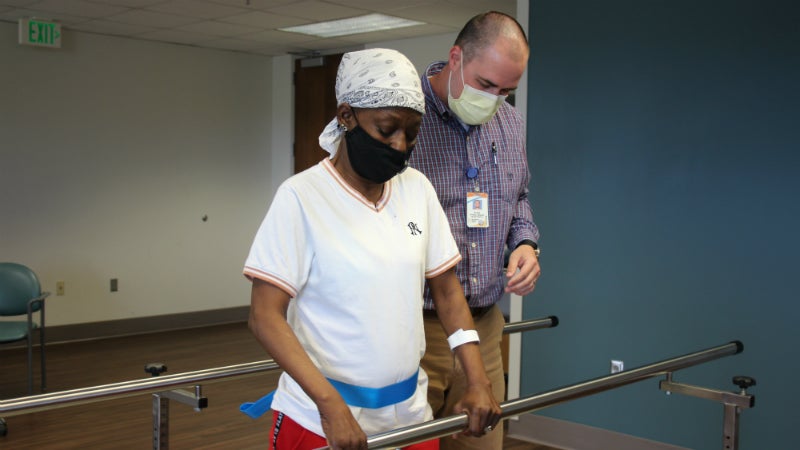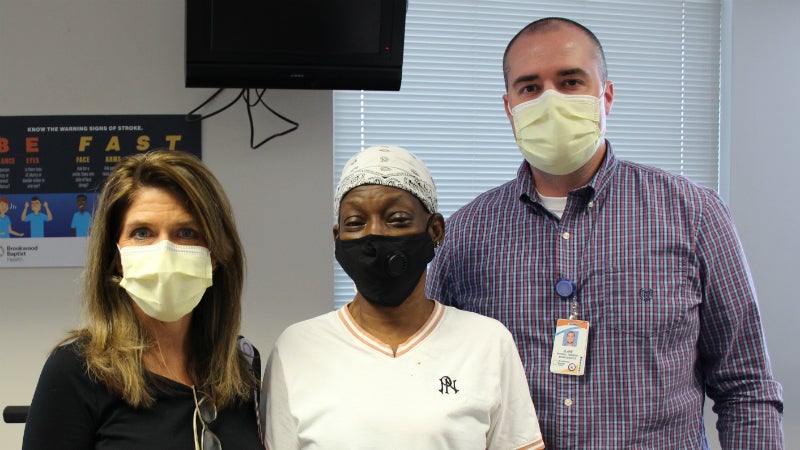Fast-acting physical therapist helps stroke victim get treatment
Published 3:13 pm Friday, May 22, 2020
|
Getting your Trinity Audio player ready...
|
ALABASTER – Mary Thomas of Montevallo felt dizzy when she started her physical therapy session with Blake Woodfin on Thursday, May 14.
Thomas was having a stroke, but fortunately for her, Woodfin was no stranger to the warning signs and her therapy was being conducted at Shelby Baptist Medical Center, where she was immediately taken to the Cardiac Intensive Care Unit and treated.
“I got on the transportation bus (to go to the hospital), and I was feeling dizzy and woozy,” Thomas said. “But that was all, I just didn’t feel right.”
Thomas told Woodfin about her dizziness, and after some light, seated exercises, he checked her vitals. Her blood pressure was low, and even lower a short time later, at which point Thomas also began experiencing a heavy feeling on her right side.
That’s when Woodfin contacted the hospital’s Rapid Response Team, which is made up of representatives from Shelby Baptist Medical Center’s emergency and CICU departments.
About seven team members quickly responded to evaluate Thomas and take her for treatment.
In about 20 minutes, Thomas had been given tPA, a drug that is used for victims of stroke related to blood clots.
“That’s incredibly fast,” Woodfin said, and though not his area of expertise, he is not unfamiliar with stroke.
Thomas was actually the third person within the past year—two patients and one spouse of a patient—who Woodfin has recognized as suffering from stroke.
Shelby Baptist Medical Center took steps to increase awareness about stroke during May, which is Stroke Awareness Month.
Alabama has the second-highest stroke mortality in the United States, behind only Mississippi, according to the Centers for Disease Control.
“This high incidence of stroke has earned Alabama a firm spot in the ‘stroke belt,’ dubbed so by the medical community and by public health experts,” said Laura G. Clark with Tenet Healthcare. “Data from the Centers for Disease Control dating back at least 40 years indicate that individuals who are from the stroke belt, including Alabama, are at least twice as likely to experience a stroke throughout their lifetimes as people of the same age who are not from the stroke belt.”
Stroke Coordinator Brittany Stegall said it is always important for people to know the warning signs of stroke, but perhaps even more so during the COVID-19 pandemic because people may be reluctant to seek treatment for fear of catching the virus.
Shelby Baptist Medical Center earned Primary Stroke Center certification in December 2019 from the American Heart Association/American Stroke Association and The Joint Commission.
Anyone who suspects themselves or someone else may be exhibiting symptoms of stroke should call 911 immediately.
Symptoms include: confusion, difficulty understanding, dizziness, loss of balance, numbness, severe headache, trouble speaking, trouble walking, vision changes and weakness.
An easy way to remember how to check for symptoms is “BE FAST:”
- Balance. Is person dizzy or cannot balance?
- Eyes. Is there loss of, blurry or double vision in one eye?
- Face. Ask for a smile. Does one side of the face droop?
- Arms. Ask the person to raise his or her arms. Does one drift downward?
- Speech. Ask for a simple sentence. Is speech slurred or strange?
- Time. If a person shows a sudden onset of symptoms, call 911 immediately.
For more information, visit BrookwoodStroke.com or Overreact2stroke.com.











